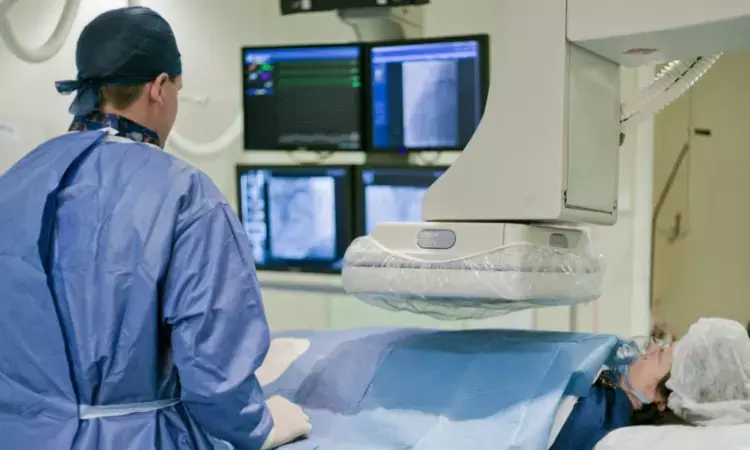- Home
- Medical news & Guidelines
- Anesthesiology
- Cardiology and CTVS
- Critical Care
- Dentistry
- Dermatology
- Diabetes and Endocrinology
- ENT
- Gastroenterology
- Medicine
- Nephrology
- Neurology
- Obstretics-Gynaecology
- Oncology
- Ophthalmology
- Orthopaedics
- Pediatrics-Neonatology
- Psychiatry
- Pulmonology
- Radiology
- Surgery
- Urology
- Laboratory Medicine
- Diet
- Nursing
- Paramedical
- Physiotherapy
- Health news
- Fact Check
- Bone Health Fact Check
- Brain Health Fact Check
- Cancer Related Fact Check
- Child Care Fact Check
- Dental and oral health fact check
- Diabetes and metabolic health fact check
- Diet and Nutrition Fact Check
- Eye and ENT Care Fact Check
- Fitness fact check
- Gut health fact check
- Heart health fact check
- Kidney health fact check
- Medical education fact check
- Men's health fact check
- Respiratory fact check
- Skin and hair care fact check
- Vaccine and Immunization fact check
- Women's health fact check
- AYUSH
- State News
- Andaman and Nicobar Islands
- Andhra Pradesh
- Arunachal Pradesh
- Assam
- Bihar
- Chandigarh
- Chattisgarh
- Dadra and Nagar Haveli
- Daman and Diu
- Delhi
- Goa
- Gujarat
- Haryana
- Himachal Pradesh
- Jammu & Kashmir
- Jharkhand
- Karnataka
- Kerala
- Ladakh
- Lakshadweep
- Madhya Pradesh
- Maharashtra
- Manipur
- Meghalaya
- Mizoram
- Nagaland
- Odisha
- Puducherry
- Punjab
- Rajasthan
- Sikkim
- Tamil Nadu
- Telangana
- Tripura
- Uttar Pradesh
- Uttrakhand
- West Bengal
- Medical Education
- Industry
Meta-analysis reveals contrasting effects of AF ablation in heart failure: Reduced vs. preserved ejection fraction

Canada: In the realm of cardiovascular health, the coexistence of atrial fibrillation (AF) and heart failure (HF) presents a complex clinical challenge, necessitating nuanced treatment approaches. A recent systematic review and meta-analysis have shed light on the differential impact of atrial fibrillation ablation in patients with heart failure, stratified by ejection fraction status.
The study, published in JAMA Cardiology found that patients with heart failure with preserved ejection fraction (HFpEF) did not derive the same benefit from catheter ablation as patients with heart failure with reduced ejection fraction (HFrEF).
"The systematic review and meta-analysis of 12 randomized clinical trials (RCTs) comprising 2465 participants with HF, we found catheter ablation of AF compared with conventional medical therapies was tied to a reduced risk of HF events in patients with reduced ejection fraction, while no benefit was observed in patients with preserved ejection fraction," the researchers reported.
Catheter ablation is associated with reduced heart failure hospitalization and death in select patients with atrial fibrillation (AF) and HFrEF. However, the benefit in patients with HFpEF is uncertain. Therefore, Alireza Oraii, Population Health Research Institute, Hamilton, Ontario, Canada, and colleagues aimed to investigate whether catheter ablation for AF is associated with reduced HF-related outcomes according to HF phenotype.
For this purpose, the researchers conducted a systematic search of online databases among studies published from inception to 2023.
The study included parallel-group RCTs comparing catheter ablation with conventional rate or rhythm control therapies in patients with HF, New York Heart Association (NYHA) functional class II or greater, and a history of paroxysmal or persistent AF. Pairs of independent reviewers screened 7531 titles and abstracts, of which the selection criteria were met by 12 RCTs and 4 substudies.
Data were abstracted in duplicate using Preferred Reporting Items for Systematic Reviews and Meta-analyses (PRISMA) reporting guidelines.
The primary outcome was heart failure events, defined as HF hospitalization, clinically significant HF worsening, or unscheduled visits to a clinician for treatment intensification. Secondary outcomes were cardiovascular and all-cause mortality.
Following were the study’s key findings:
- 12 RCTs with 2465 participants (mean age, 65.3 years; 26.7%) were included; there were 1552 participants with HFrEF and 913 participants with HFpEF.
- Compared with conventional rate or rhythm control, catheter ablation was associated with reduced risk of HF events in HFrEF (risk ratio [RR], 0.59), while there was no benefit in patients with HFpEF (RR, 0.93).
- Catheter ablation was associated with a reduced risk of cardiovascular death compared with conventional therapies in HFrEF (RR, 0.49) but a differential association was not detected in HFpEF (RR, 0.91).
- No difference in the association of catheter ablation with all-cause mortality was found between HFrEF (RR versus conventional therapies, 0.63) and HFpEF (RR versus conventional therapies, 0.95) groups.
In conclusion, the study found that catheter ablation for AF was tied to a reduced risk of HF events in patients with HFrEF but had limited or no benefit in HFpEF.
"Results from ongoing trials may further elucidate the role of catheter ablation for atrial fibrillation in HFpEF," the researchers wrote.
Reference:
Oraii A, McIntyre WF, Parkash R, et al. Atrial Fibrillation Ablation in Heart Failure With Reduced vs Preserved Ejection Fraction: A Systematic Review and Meta-Analysis. JAMA Cardiol. Published online April 24, 2024. doi:10.1001/jamacardio.2024.0675
Dr Kamal Kant Kohli-MBBS, DTCD- a chest specialist with more than 30 years of practice and a flair for writing clinical articles, Dr Kamal Kant Kohli joined Medical Dialogues as a Chief Editor of Medical News. Besides writing articles, as an editor, he proofreads and verifies all the medical content published on Medical Dialogues including those coming from journals, studies,medical conferences,guidelines etc. Email: drkohli@medicaldialogues.in. Contact no. 011-43720751


